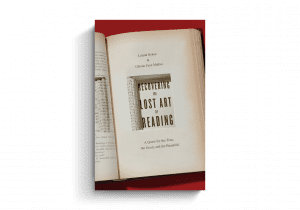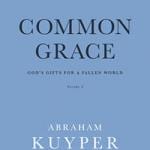
How should Christians read books? That’s not as simple a question to answer as it appears at first glance. Part of the reason this is a difficult question to answer is that there are a lot of different types of things to read: poetry, non-fiction, and fiction; and then different genres within each of those (as just a handful of examples). Different kinds of writing require different methods of reading even before we start to consider content and style as factors.
But the diversity of materials to read isn’t the only difficulty in play here. Another, and I think a bigger, difficulty is caused by the damage that has been done to us by the pervasive presence of electronic devices. I’m not denying that these devices have conveniences—what reasonable person could deny that? But their impact on our capacity to concentrate and retain information has been devastating. So learning how to read properly is a more critical skill than ever. Fortunately to help us along the way, Leland Ryken and Glenda Faye Mathes have written the new book Recovering the Lost Art of Reading.
Part one of Recovering the Lost Art of Reading makes the case that reading is an art, and that said art has been lost. Part three argues that the art of reading is worth restoring to personal and public practice (though the focus is definitely on personal; someone else needs to write a book about the social impact of the collapse of literacy; or, if they want people to actually read it, they need to record their thesis as a dance on TikTok). Part two of Recovering the Lost Art of Reading gives an overview of what ‘literature’ is, and then a brief introduction to different types of literature and how to best read them (including, but not limited to, fantasy, poetry, nonfiction, children’s literature, etc).
I’m happy to recommend this book, but I’ve also got to admit that this book is not really written for me. I’m the choir to which Ryken and Mathes are preaching, and am already sold on the claim that people need to read more and read better.
That said, I think there is an issue here that needs some attention. There is a disconnect which the authors are apparently unaware of in chapter 4, “What is literature?” Beginning with a jeremiad about the collapse of the study of literature in colleges, the authors note the transition from the study of ‘literature’ to ‘texts’
“Half a century ago… Academia rejected the idea of defining literature.
The fallout was predictable: if it is impossible to define the differentiating properties of literature as a form of writing, then all writing and even non-writing becomes fair game to be considered literature. This is precisely what happened… The generic term text opened the door to teach any written document–in fact, the term quickly expanded to encompass nonverbal artifacts. Here is a representative list of courses currently offered in literature departments at prestigious universities: “The Politics of Hip-Hop”; “Digital Game Studies”; “The Art of Insult.” (That last one was allowed as a substitute for a course in Shakespeare.) A student… reported taking a literature course that had no texts at all. Instead of scrutinizing great works of literature, the class did activities such as visiting a toy store to see what packaging was gender-biased and spending an evening in a gay bar.” (53-54)
Aside from the hand-wringing here over the state of education these days (hand-wringing with which I agree, for what it’s worth), and aside from my being triggered here as someone who teaches both a film class and a class on Country music (albeit in “Politics” rather than in the English department), the problem comes when at the end of the chapter we are given the summary definition of ‘literature’:
“What is literature? It can be briefly defined as a concrete, interpretive presentation of human experience in artistic form.” (61)
Leading up to this summary, literature is discussed as “experiential,” “concrete” (i.e. real, rather than abstract), “universal”, “interpretive,” and “artistic.” The disconnect, then, comes in this definition of literature when contrasted with their earlier objection to the replacing of ‘literature’ with ‘texts.’ If literature is “experiential”, “concrete,” etc, why wouldn’t something like the packaging on a toy, a video game narrative, or the lyrics of a rap song meet the definition of literature Ryken and Mathes provide? Are they not “concrete, interpretive presentation[s] of human experience in artistic form”? Which of the criteria do they not meet?
Perhaps the objection is that the lyrics of the song in question or the plot of the video game or the writing on the side of the toy do not rise to the level of ‘art’. Maybe so, but then again neither do most books. And even if most Hip-Hop isn’t great art, surely at least some of it is (heck, maybe all of it is–I’m no Hip-Hop expert). Whether it’s all art or none of it is, Hip-Hop certainly certainly checks the boxes of experiential, concrete, etc. Why wouldn’t it be fair game for study as literature?
It seems that the true determiner here, albeit unmentioned, is that most of the things mentioned as false replacements for literature don’t really require focused reading. At least, reading the side of a toy or listening to rap isn’t the same activity as reading a book. That much is certainly true, and it must matter–though exactly how I’m not clear.
Still, aside from this disconnect Recovering the Lost Art of Reading is a worthwhile book, and I pray that it facilities the recovery of that critical lost art.
Dr. Coyle Neal is co-host of the City of Man Podcast and an Associate Professor of Political Science at Southwest Baptist University in Bolivar, MO












